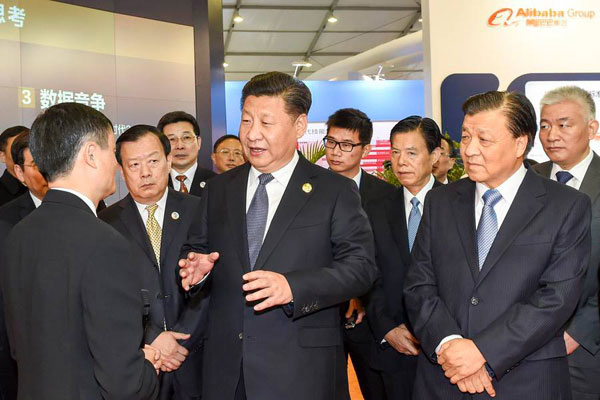- Search
-
Web.
During the Second World Internet Conference that concluded in Wuzhen, President Xi Jinping showed up in person and delivered a keynote speech, a proof of the unprecedented attention the government gives to the development of Internet in China. By taking personal interest, Xi showed that the development of this sector is a priority. The following is a list of Internet giants that Xi showed interests in during the event.

Xi's first stop - Alibaba booth
The exhibition booth of Alibaba Group was Xi Jinping's "first stop" during his visit to the "Light of the Internet" expo in Wuzhen of eastern China's Zhejiang province on Dec 16, 2015. Jack Ma, founder and chairman of Alibaba Group, introduced the development and trends of his company.
Ma said that through the company's online transaction platforms, 8.5 million active sellers have served 386 million customers from around the world. The company has created about 10 million direct job opportunities and 3.52 million indirect job opportunities. Its total transaction value this year is expected to exceed $490 billion (3 trillion yuan), which is bigger than the combined global transactions of walmart.com.
Ma also "presented" his plan which includes promoting the development of rural e-commerce to eradicate poverty, setting the rules for E-World Trade Organization (E-WTO) and realizing 72-hour delivery to the whole world, as well as taking the lead in the new era of data technology and boosting the development of traditional industries.
Riding the Ninebot mini
During Xi's visit to the "Light of the Internet" expo, Lei Jun, chairman and CEO of Xiaomi Inc, introduced Xi a series of Xiaomi products, including the smartphone, smart TV and also the Ninebot mini, a self-balancing short walking robot co-developed by Ninebot and Xiaomi. Xi even experienced the technology products: riding the Ninebot mini.
Baidu booth: self-driving car and online translation
Baidu self-driving car is a highlight at the expo. When visiting the Baidu booth, Xi listened to the development of the driver-less cars and online translation of the online search giant.
Baidu said earlier this month that it plans to put self-driving cars on the roads in the next three years. The Beijing-based company, which successfully completed the test drive of its self-driven car on various roads last week, said it intends to mass-produce the vehicles within five years.
Using artificial intelligence and big data technology, Baidu Online Translation realizes high-quality machine translation, which covers 14 languages in 33 countries and regions in the One Belt and One Road Initiative.
Visit to Didi Kuaidi's booth
During President Xi's visit to the "Light of the Internet" expo, the CEO of Didi Kuaidi, China's largest car-on-demand service provider, talked about the development of Didi Kuaidi's business and his expectations of the industry.
"Didi Kuaidi gained rapid expansion in the past three years while competing with the US rivals," Cheng Wei told President Xi.
The company has invested in Lyft, GrabTaxi and Ola to reach nearly 50 percent of the world's population, he said.
Cheng also showed President Xi the big data platform of Didi Kuaidi through which he hopes to provide better services for Chinese citizens.
WeChat's Red Envelope
When visiting the booth of Tencent Holdings, Xi showed interest in WeChat Red Envelope and he asked Tencent staff members at the expo: "How many WeChat red envelopes did you grab during the Spring Festival?" The game of giving red envelopes online was invented by WeChat during the 2014 Spring Festival in order to gain new mobile payment users.
Pony Ma, chairman and CEO of Tencent, also spoke about booking a doctor online, among other things.
Cybersecurity: Sky Eye and Sky Net
Zhou Hongyi, CEO of Internet security and search company Qihoo 360, showcased his company's Sky Eye and Sky Net systems to Xi.
The Sky Eye system is a real time monitoring and early warning system for global cyberattacks. It is actually the radar in cyberspace which could capture real-time cyberattacks above a certain scale that happen at any corner of the world. The system could identify some high-caliber cyber attackers using big data analysis.
Enhanced by defensive capabilities, the Sky Eye becomes Sky Net system, which is China's first global cyber defensive system based on big data. The Sky Net system has continuously tracked overseas hackers for two years and found an organization named "Ocean Lotus" which had organized Internet hacks targeting the Chinese government's maritime administration, marine constructors and research institutions, and shipping companies.
Zhou also told Xi that he hopes that in the future key government agencies could deploy domestic cybersecurity products to build China's capabilities in this field.
 津公网安备 12010102000496号
津公网安备 12010102000496号